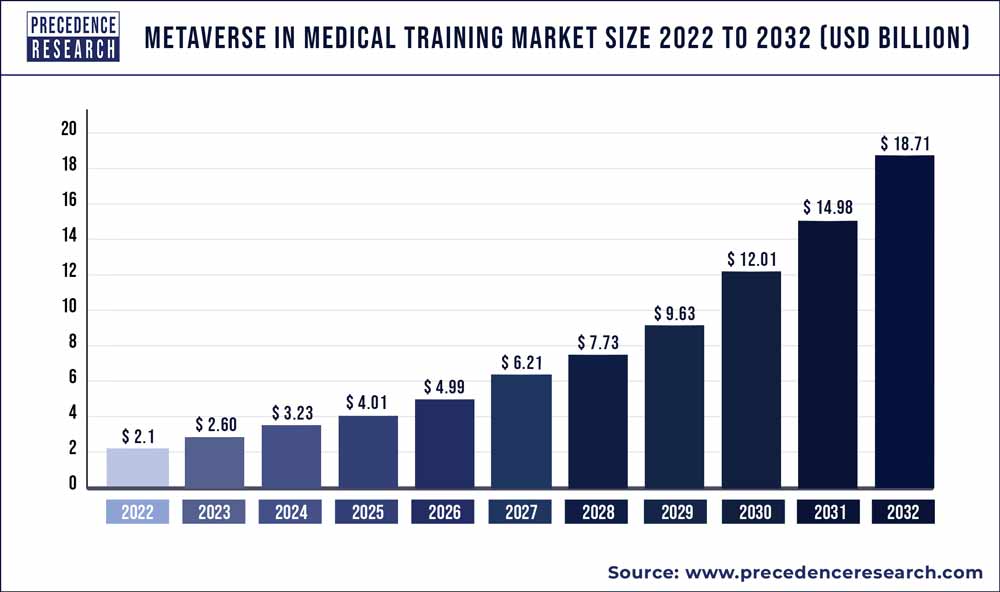The global metaverse in medical training market size was valued at USD 2.60 billion in 2023 and is expected to reach around USD 18.71 billion by 2032, poised to grow at a CAGR of 24.50% during the forecast period from 2023 to 2032.

The Metaverse in Medical Training market represents the convergence of cutting-edge technology and healthcare education, creating a transformative learning environment for aspiring medical professionals. In this virtual realm, medical training transcends traditional boundaries, offering immersive experiences that simulate real-world scenarios. As the healthcare industry embraces the digital age, the Metaverse becomes a pivotal space for honing crucial skills, fostering collaboration, and enhancing the overall efficiency of medical education.
The adoption of the Metaverse in Medical Training brings forth a revolutionary shift from conventional learning methods to dynamic, interactive simulations. Through virtual reality (VR) and augmented reality (AR) applications, medical students can engage in lifelike surgeries, patient consultations, and diagnostic procedures, gaining practical experience in a risk-free environment. The Metaverse acts as a bridge between theoretical knowledge and hands-on practice, elevating the proficiency and confidence of medical professionals in training.
Get a Sample: https://www.precedenceresearch.com/sample/3545
Growth Factors:
Enhanced Learning Efficacy: The immersive nature of the Metaverse facilitates accelerated learning by providing a realistic and engaging platform. Medical students can repeat complex procedures, explore diverse medical scenarios, and learn from mistakes, leading to a more profound understanding of medical practices.
Global Accessibility: The Metaverse eliminates geographical barriers, enabling medical students worldwide to access standardized, high-quality training. This inclusivity fosters a diverse learning community, promoting the exchange of knowledge and cultural insights among aspiring healthcare professionals.
Cost Efficiency: Traditional medical training often involves significant expenses for resources, facilities, and materials. The Metaverse offers a cost-effective alternative, reducing the need for physical infrastructure and resources while maintaining a high standard of education.
Real-time Collaboration: Medical professionals can engage in collaborative exercises within the Metaverse, regardless of their physical location. This real-time collaboration enhances teamwork and communication skills, essential for effective healthcare delivery in real-world settings.
Adoption of Advanced Technologies: As technology continues to advance, the Metaverse in Medical Training is poised to integrate emerging technologies like artificial intelligence and haptic feedback systems. These advancements will further refine the simulation experience, providing an even more realistic and responsive training environment.
Challenges
The metaverse in medical training addresses various challenges in traditional healthcare education, providing a solution for limited access to diverse clinical cases and the need for continuous practice. Through realistic simulations, medical practitioners can refine their skills, enhance decision-making abilities, and gain exposure to a broader range of medical scenarios. Additionally, the metaverse facilitates collaborative learning, allowing healthcare professionals from different parts of the world to interact, share insights, and collectively contribute to advancing medical knowledge.
Opportunities
Despite the promising opportunities, the integration of the metaverse into medical training comes with its own set of challenges. Technological barriers, ethical considerations, and the need for standardized content and assessment methods are among the factors that must be carefully navigated. Furthermore, ensuring the security and privacy of patient data in virtual medical scenarios is of paramount importance.
Metaverse in Medical Training Market Players
- Oculus VR, LLC
- Osso VR
- Touch Surgery
- Medical Realities
- Precision OS
- FundamentalVR
- VirtaMed
- CAE Healthcare
- 3D Systems Corporation
- Medtronic
- ImmersiveTouch Inc.
- Microsoft Corporation
- Samsung Electronics
- Philips Healthcare
- Surgical Science
Segments Covered in the Report
By Component
- Software
- Hardware
By Technology
- AR
- VR
- AI
- MR
By Devices
- VR Headsets
- AR Devices
- Mixed Reality Platforms
By End User
- Medical Schools and Universities
- Hospitals and Healthcare Institutions
- Pharmaceutical Companies
- Others
By Geography
- North America
- Europe
- Asia-Pacific
- Latin America
- Middle East and Africa
Contact Us:
Mr. Alex
Sales Manager
Call: +1 9197 992 333
Email: sales@precedenceresearch.com
Web: https://www.precedenceresearch.com
Blog: https://www.expresswebwire.com/
Blog: https://www.uswebwire.com/


0 Comments